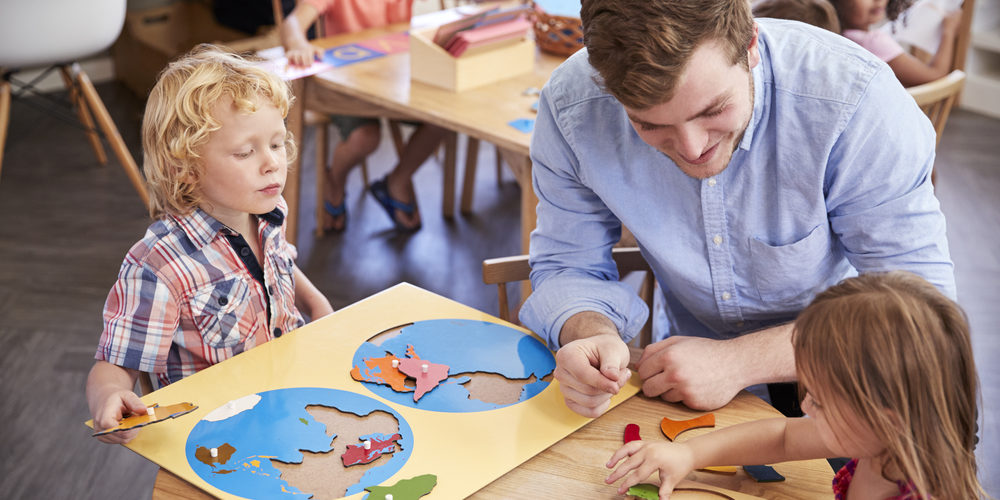Did you know that the top five types of skills and knowledge employers want from new hires are embedded in a Montessori education? Employers are looking more and more for people who have creativity, innovation, critical thinking skills, the ability to work alone and as a team, time management skills, and accountability. Look at a classroom from any Philadelphia Montessori school, and you will see children mastering these skills at an early age.
When such skills come second nature, it’s much easier for those children to become highly successful adults.
So the short answer is yes, Montessori does prepare children for the real world. Now, let’s go a bit deeper into how Montessori schools do just that.
Dealing With Emotions Healthily
Montessori classrooms focus on more than knowledge that helps children master physical skills. One of the most important aspects of the curriculum is discipline and self-control. People who master self-regulating skills can better handle stress, and they will be able to make much better choices because they aren’t externally influenced.
Studies (like the Marshmallow Test) have found that children who are taught self-discipline often perform better in school, have better health and wellness, and are less likely to suffer from unhealthy habits, such as drug and alcohol abuse.
Discipline is taught by providing the children with expectations, tasks, and emotional validation. Should a child act out, the consequences of their actions are clearly noted, and they can learn right from wrong over time. Teachers also remain calm when children act out and encourage their students to talk about their emotions.
Real World Time Management
In a Montessori school in Philadelphia and anywhere else, the classroom is multi-aged and collaborative. The multi-age classrooms are designed to let the older students develop leadership skills and for the younger students to assist on group projects. This develops a sense of community and togetherness.
Additionally, the students are not forced to sit in on lectures throughout the day. Instead, the teacher will be a guide who walks around the classroom, helping small groups or individuals as needed.
This mimics a real life experience. Take an office, for instance. Every employee is working on something separate, sometimes alone or with other coworkers. People have their own tasks that they need to focus on, and when they need assistance, they look to a leader for support. The office is diverse, just like the classroom, and people need to communicate effectively with people of different age groups.
Daily Life Skills & Knowledge
There are many ways Montessori school differs from traditional education, but the most obvious is what the students focus on. Students are encouraged to delve into their own interests through learning materials and educational books. At the same time, they work on essential life skills, like cooking, cleaning, and organizing a space.
This doesn’t mean Montessori schools don’t teach things like reading, mathematics, and science, either. Rather, instead of lecturing on a topic and forcing the students to sit through the lesson, Montessori classrooms allow students to learn by doing. Simulations, games, wooden blocks, kinetic sand, experiments, and constructing air-powered rockets can all be incorporated into the Fishtown Montessori curriculum.
Assessment and Correction
One of the jobs of the Montessori teacher is to observe and assess the progress of each individual student throughout the year. Not only does the teacher prepare the learning environment to be stimulating and accessible, but they also create learning outcomes for each child. Within this learning environment, each student has the opportunity to work on and master skills, seek answers, and gain knowledge.
As children mature, they begin to discover that many of the tools and projects leave room for self-assessment and self-correction. They think more critically about the work they’ve been given, and they will become far more skilled at recognizing and revising their own mistakes.
This can start very young, from the first lesson of cleaning up spilled water and trying again. Students in a Montessori classroom learn how to deal with the frustration of being unskilled then practicing again and again until they do it right.
Adaptability
Montessori classrooms are designed to provide freedom within limits, so that the children can develop their skills on their own time. These skills often increase their independence in some way, such as learning how to solve equations, communicating needs, pairing up to accomplish a project, or simply learning how to dish out a satisfying snack.
Classrooms also have only one of every activity. This means that students can freely choose what they want to work with, but they often have few options. Some students will pair up to work on the same activity, while others might select a solo option. This combination of collaborative, partner, and solo lessons gives children both confidence to do things alone as well as interpersonal skills.
Final Thoughts
Does a Montessori education prepare children for the real world? Yes, it does. The Montessori approach teaches children to think critically, to innovate, and to be confident and determined. By allowing students to work alone or together, and to make discoveries instead of rote memorization, Montessori schools are fostering the next generation of responsible, inventive, and compassionate adults.






